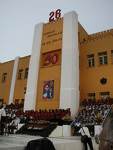Young Fidel

And here I thought there was nothing to write about. The New York Times has printed some excerpts from a series of letters Fidel Castro wrote while in prison after the attack on the Moncada barracks. These letters have recently been translated and will soon be published in new collection. The anti-Castroites will have fun with some of them, this quote in particular.
Third, maintain a deceptively soft touch and smile with everyone. Follow the same strategy that we followed during the trial; defend our points of view without raising resentments. There will be enough time later to squash all the cockroaches together.No doubt his critics will see in this proof that he had always planned to install a Soviet style dictatorship in Cuba, all claims to the contrary. I for one find any efforts to discern what Fidel believed and when he believed it to be pointless. The only man who truly knows has proven himself to be highly unreliable witness - we can only judge by what he actually did, and when he did it. It is the portrait of young Fidel as a misogynist that is more interesting to me. His deep anger that his wife, left alone with their young son, while Fidel was in jail, would take a job with the government he so loathed, is a sight to behold.
This is a machination against me: the basest, most cowardly, most indecent, the vilest and intolerable. Mirta is too level-headed to have ever allowed herself to be seduced by her family, agreeing to appear in the Government employee roster, no matter how hard her economic situation. I am sure she has been miserably slandered... Only an effeminate like Hermida at the lowest degree of sexual degeneration would resort to these methods, of such inconceivable indecency and unmanliness.For Fidel, it was his honor that mattered, not his wife's ability to put food on the table. That Fidel is an extraordinary egoist is hardly a secret, though I suspect this attitude towards his wife had as much to do with traditional machismo as it did with his own personality. His homophobia is also likely a cultural artifact as much as a personal one, and sheds a small amount of light on the Cuban regime's generally hostile attitude towards homosexuals. We should not, of course, assume that the writings of a man at 27 teach us much about that man at 80. The value of these letters for understanding the present is limited, but they will no doubt be dissected thoroughly down in Miami nonetheless.

No comments:
Post a Comment